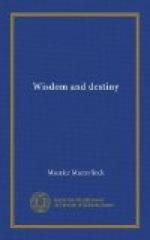Instinct and destiny are for ever conferring together; they support one another, and rove, hand in hand, round the man who is not on his guard. And whoever is able to curb the blind force of instinct within him, is able to curb the force of external destiny also. He seems to create some kind of sanctuary, whose inviolability will be in the degree of his wisdom and the consciousness he has acquired becomes the centre of a circle of light, within which the passer-by is secure from the caprice of fate. Had Jesus Christ or Socrates dwelt in Agamemnon’s palace among the Atrides, then had there been no Oresteia; nor would Oedipus ever have dreamed of destroying his sight if they had been tranquilly seated on the threshold of Jocasta’s abode. Fatality shrinks back abashed from the should that has more than once conquered her; there are certain disasters she dare not send forth when this soul is near; and the sage, as he passes by, intervenes in numberless tragedies.
13. The mere presence of the sage suffices to paralyse destiny; and of this we find proof in the fact that there exists scarce a drama wherein a true sage appears; when such is the case, the event needs must halt before reaching bloodshed and tears. Not only is there no drama wherein sage is in conflict with sage, but indeed there are very few whose action revolves round a sage. And truly, can we imagine that an event shall turn into tragedy between men who have earnestly striven to gain knowledge of self? But the heroes of famous tragedies do not question their souls profoundly; and it follows therefrom that the beauty the tragic poet presents is only a captive thing, is fettered with chains; for were his heroes to soar to the height the real hero would gain, their weapons would fall to the ground, and the drama itself become peace—the peace of enlightenment. It is only in the Passion of Christ, the Phaedo, Prometheus, the murder of Orpheus, the sacrifice of Antigone—it is only in these that we find the drama of the sage, the solitary drama of wisdom. But elsewhere it is rarely indeed that tragic poets will allow a sage to appear on the scene, though it be for an instant. They are afraid of a lofty soul; for they know that events are no less afraid, and that a murder committed in the presence of the sage seems quite other than the murder committed in the presence of those whose soul still knows not itself. Had Oedipus possessed the inner refuge that Marcus Aurelius, for instance, had been able to erect in himself—a refuge whereto he could fly at all times—had he only acquired some few of the certitudes open to every thinker—what could destiny then have done? What would she have entrapped in her snares? Would they have contained aught besides the pure light that streams from the lofty soul, as it grows more beautiful still in misfortune?
But where is the sage in Oedipus? Is it Tiresias? He reads the future, but knows not that goodness and forgiveness are lords of the future. He knows the truth of the gods, but not the truth of mankind. He ignores the wisdom that takes misfortune to her arms and would fain give it of her strength. Truly they who know still know nothing if the strength of love be not theirs; for the true sage is not he who sees, but he who, seeing the furthest, has the deepest love for mankind. He who sees without loving is only straining his eyes in the darkness.




